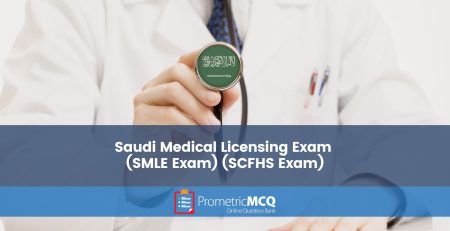
Saudi Medical Licensure Examination (SMLE)
Webmaster2024-03-03T02:27:01+00:00The Saudi Medical Licensure Examination (SMLE) is a crucial examination for medical professionals in Saudi Arabia. It is a comprehensive assessment that evaluates the knowledge and skills of medical practitioners to ensure they meet the required standards for practicing medicine in the country.
Passing the SMLE is of utmost importance as it is a prerequisite for obtaining a medical license and practicing medicine in Saudi Arabia.
Key Takeaways
- The Saudi Medical Licensure Examination (SMLE) is a mandatory exam for medical professionals in Saudi Arabia.
- Eligibility criteria for the SMLE include having a medical degree from an accredited institution and a valid residency permit.
- The registration process for the SMLE involves submitting an online application and paying the exam fee.
- The SMLE consists of two parts: a computer-based test and a clinical skills exam.
- The exam content covers a wide range of medical topics, including anatomy, pharmacology, and ethics.
- Preparation for the SMLE should include studying from reliable sources and practicing with sample questions.
- Passing the SMLE is crucial for medical professionals to obtain a license to practice in Saudi Arabia.
- The SMLE results are scored on a pass/fail basis, with a minimum passing score of 60%.
- Retaking the SMLE is allowed, but there are specific rules and regulations that must be followed.
- Passing the SMLE opens up career opportunities for medical professionals in Saudi Arabia.
Table of Contents
ToggleWhat is the Saudi Medical Licensure Examination (SMLE)?
The Saudi Medical Licensure Examination (SMLE) is an examination designed to assess the competency of medical professionals in Saudi Arabia. It is administered by the Saudi Commission for Health Specialties (SCFHS), which is responsible for regulating and supervising healthcare professions in the country.
The purpose of the SMLE is to ensure that medical professionals have the necessary knowledge and skills to provide safe and effective healthcare services to patients.
Eligibility criteria for the Saudi Medical Licensure Examination – SMLE
To be eligible to take the SMLE, medical professionals must meet certain criteria. Firstly, they must have completed their medical education from an accredited institution recognized by the SCFHS. Additionally, they must have a minimum of one year of professional experience after graduation.
This experience can be obtained through internships, residency programs, or clinical practice. Lastly, candidates must demonstrate proficiency in the English language, as the Saudi Medical Licensure Examination is conducted in English.
Registration process for the SMLE – Saudi Medical Licensure Examination
The registration process for the Saudi Medical Licensure Examination involves several steps. Firstly, candidates need to create an account on the SCFHS website and provide all necessary personal information.
They will then need to upload their educational documents, including their medical degree and transcripts. After completing these steps, candidates will need to pay the registration fee and select their preferred exam date and location.
Exam format and structure of the Saudi Medical Licensure Examination – SMLE
The SMLE consists of multiple-choice questions (MCQs) that assess a candidate’s knowledge and understanding of various medical topics. The exam is divided into two parts: Part 1 and Part 2.
Part 1 consists of 150 MCQs, while Part 2 consists of 100 MCQs. Candidates are given a specific time limit to complete each part of the exam.
Exam content and topics covered in the Saudi Medical Licensure Examination

The Saudi Medical Licensure Examination covers a wide range of medical topics to ensure that candidates have a comprehensive understanding of various areas of medicine.
The exam content includes subjects such as anatomy, physiology, pathology, pharmacology, microbiology, and clinical medicine. Each section of the exam focuses on specific topics within these subjects, and it is important for candidates to study all topics thoroughly to perform well on the exam.
Preparation tips and resources for the Saudi Medical Licensure Examination
Preparing for the SMLE requires dedication and a well-structured study plan. Candidates are advised to use a variety of study materials and resources, including textbooks, online resources, and review courses. It is important to create a study schedule and allocate sufficient time for each topic.
Additionally, practicing with sample questions and taking mock exams can help candidates familiarize themselves with the exam format and improve their test-taking skills.
Importance of passing the SMLE for medical professionals
Passing the SMLE is crucial for medical professionals as it is a requirement for obtaining a medical license in Saudi Arabia.
A medical license is necessary to practice medicine in the country and provides numerous benefits, including career opportunities, professional recognition, and job security. Failing the SMLE can have serious consequences, such as delaying or hindering career advancement.
SMLE results and scoring system
The SMLE is scored on a scale from 0 to 100, with a passing score of 60 or above. The exam is computer-based, and results are typically available within a few weeks after the exam date. Candidates receive a score report that provides detailed information about their performance in each section of the exam.
It is important for candidates to interpret their results and identify areas of weakness to improve their study plan for future attempts.
Retaking the SMLE: rules and regulations
Candidates who do not pass the Saudi Medical Licensure Examination have the option to retake the exam. However, there are certain rules and regulations that must be followed.
Candidates are allowed a maximum of three attempts to pass the exam, with a waiting period of at least three months between each attempt. It is important for candidates to identify areas of weakness and develop a more effective study plan to increase their chances of success in subsequent attempts.
Future prospects and career opportunities after passing the SMLE
Passing the Saudi Medical Licensure Examination opens up numerous career opportunities for medical professionals in Saudi Arabia. With a medical license, professionals can work in various healthcare settings, including hospitals, clinics, and research institutions.
Additionally, passing the SMLE is often a requirement for career advancement, such as pursuing specialty training or academic positions.
The Saudi Medical Licensure Examination (SMLE) is a critical examination for medical professionals in Saudi Arabia. It is important for candidates to take the exam seriously and prepare thoroughly to increase their chances of success.
By understanding the exam format, studying all topics thoroughly, and utilizing appropriate study resources, candidates can improve their performance on the SMLE and open up new opportunities for their medical careers in Saudi Arabia.
If you’re preparing for the Saudi Medical Licensure Examination (SMLE), you may also find the article “Saudi SCFHS License: Everything You Need to Know” helpful.
This comprehensive guide provides detailed information about the licensing process, eligibility criteria, and exam format. It also offers valuable tips and resources to help you prepare effectively for the SMLE. Check out the article here to ensure you’re fully prepared for this important examination.
FAQs
The SMLE – Saudi Medical Licensure Examination consists of 300 multiple-choice questions (MCQs), divided into three sections. Each section comprises 100 questions, and the total duration of the exam is 6 hours.
Candidates are given two scheduled breaks, one between sections 1 and 2, and another between sections 2 and 3. The exam includes up to 20 pilot questions, which are not scored.
Each question provides four answer options, from which the candidate must choose the best answer.
The passing score for general practitioners is 70%, corresponding to a score of 560 on the 200-800 reporting scale.
However, the required passing percentage varies for different roles: 60% for medical officers and 80% for consultants.
Candidates outside Saudi Arabia are allowed up to 3 attempts within a year, while those inside Saudi Arabia are permitted up to 3 attempts within a 6-month period. This policy ensures that all candidates have fair and sufficient opportunities to pass the examination
Applicants must have a minimum of one year of post-house job experience. The verification of all educational and professional documents is done through the Dataflow Group, the official verifying partner for the Saudi Commission. This process typically takes between 2 to 8 weeks to complete
The application process begins with creating an account on Mumaris Plus, a unified portal for practitioners in Saudi Arabia.
Applicants must submit various documents, including their original degree certificate, registration certificate, qualification transcript, passport-size photo, passport copy, and Iqama copy (if residing in Saudi Arabia).
The application process involves an administration fee of 200 riyals, followed by a review period of 2 weeks to 2 months. An additional fee of 900 riyals is required upon review completion, after which the applicant receives an eligibility number for the exam
After obtaining the eligibility number, candidates must visit the Prometric examination website, select the Saudi Commission for Health Specialties (SMLE) as their exam, enter their eligibility number and the first four letters of their last name, and schedule their exam date. The examination fee is $280
Successful candidates can download their classification certificate from Mumaris Plus. With this certificate, they can begin searching for job opportunities.
Once employed under the sponsorship of an institution, they can complete the registration process with the Saudi Commission for Health Specialties to receive both classification and registration certificates
The Saudi Commission for Health Specialties (SCFHS) has specific rules for practitioners who have gaps in their professional practice.
Teaching, research, or administrative experience is not counted as clinical practice. If a practitioner has a discontinuity of 2 to 4 years, a 3-month training is required; for 4 to 6 years, a 6-month training; and for more than 6 years, a 12-month training is necessary.
Yes, the SMLE consists exclusively of multiple-choice questions (MCQs), each with four answer options. Candidates are required to choose the one best answer for each question
Candidates should regularly check the official website of the Saudi Commission for Health Specialties (SCFHS) and the Mumaris Plus portal for any updates or changes regarding the SMLE.
These platforms provide the latest information on exam dates, application processes, and any modifications in the exam structure or content


